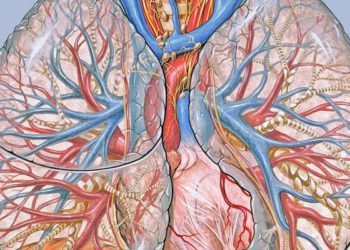Febuxostat is not associated with worse cardiovascular safety outcomes or all-cause mortality compared to allopurinol
1. Febuxostat was non-inferior to allopurinol for primary cardiovascular endpoints including hospitalization for non-fatal myocardial infarction or biomarker-positive acute coronary syndrome, non-fatal stroke, or cardiovascular death during the treatment period.
2. Treatment with febuxostat was not associated with an increase in cardiovascular or all-cause mortality compared to allopurinol.
Evidence Rating Level: 2 (Good)
Study Rundown: Adequate long-term management of gout often requires urate lowering therapy to reduce serum urate below its crystallization threshold and prevent urate deposition, recurrent flares of gout and progressive joint damage. Initial clinical trials comparing febuxostat to allopurinol, two xanthine oxidase inhibitors, identified a higher risk of cardiovascular events in patients taking febuxostat. While this has been subsequently disproven in other randomized controlled trials, there were some lingering concerns about the possibility of increased cardiovascular risk with febuxostat versus allopurinol. This randomized, open-label, non-inferiority trial compared febuxostat versus allopurinol in adults with gout in the UK, Sweden and Denmark. Patients also had at least one additional cardiovascular risk factor and were already receiving allopurinol therapy. Results suggested that febuxostat was non-inferior to allopurinol for the primary cardiovascular endpoints. Additionally, treatment with febuxostat was not associated with an increase in serious adverse events or all-cause mortality compared to allopurinol. The current study has several notable limitations. Notably, patients included in this study had less-severe gout, were at lower cardiovascular risk and were already taking allopurinol at study entry compared to patients in the earlier post-market study (CARES trial) comparing febuxostat to allopurinol. Thus, it is unclear whether the results of this study can be generalized to patients with higher cardiovascular risk or patients with poorly controlled gout at baseline. Nonetheless, the results of the current study do highlight that febuxostat may be a reasonable alternative to allopurinol, particularly in patients with relatively low cardiovascular risk.
Click to read the study in The Lancet
Relevant Reading: Cardiovascular Safety of Febuxostat or Allopurinol in Patients with Gout
In-Depth [randomized controlled trial]: This randomized, open-label, non-inferiority trial conducted across three European countries compared febuxostat to allopurinol in patients aged >60 years with gout. All patients included were already receiving allopurinol at time of study onset and had at least one additional cardiovascular risk factor. Patients were randomly assigned to either continue allopurinol or start febuxostat at 80 mg/day with up-titration to 120 mg/day to achieve target serum urate concentration of less than 0.357 mmol/L. The primary compositive outcome was hospitalization for non-fatal myocardial infarction, biomarker-positive acute coronary syndrome, non-fatal stoke, or cardiovascular death during the study period.
A total of 6128 patients (mean age 71 years, 85.3% male) were included in the analysis and the median on-treatment follow-up period was 1324 days (IQR 870 to 1919). For the primary on-treatment analysis, febuxostat was non-inferior to allopurinol for incidence of the primary composite endpoint (allopurinol 2.054 events/100 patient-years; febuxostat 1.723 events/100 patient-years; adjusted hazard ratio [HR] 0.85, 95% CI 0.70-1.03, pnon-inferiority<0.0001). 222 (7.2%) of patients taking febuxostat died and 1720 (57.3%) had at least one serious adverse effect while 263 (8.6%) of patients taking allopurinol died and 1812 (59.4%) had at least one serious adverse event. Reductions in urate concentrations from baseline were greater on febuxostat treatment than on allopurinol treatment (p<0.0001) with mean differences greater than 0.08 mmol/L for years 1-6. Overall, febuxostat was reported to significantly reduce urate concentrations without increasing risk for adverse cardiovascular events compared to allopurinol.
Image: PD
©2020 2 Minute Medicine, Inc. All rights reserved. No works may be reproduced without expressed written consent from 2 Minute Medicine, Inc. Inquire about licensing here. No article should be construed as medical advice and is not intended as such by the authors or by 2 Minute Medicine, Inc.






